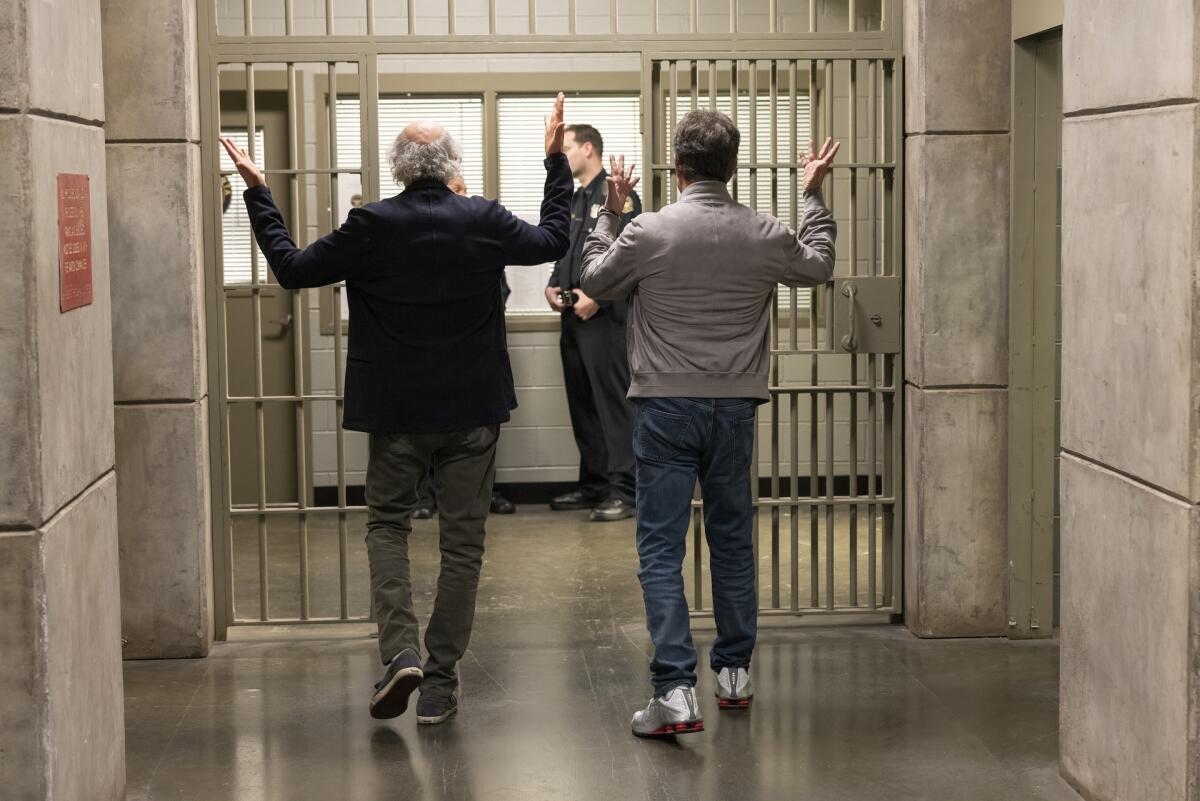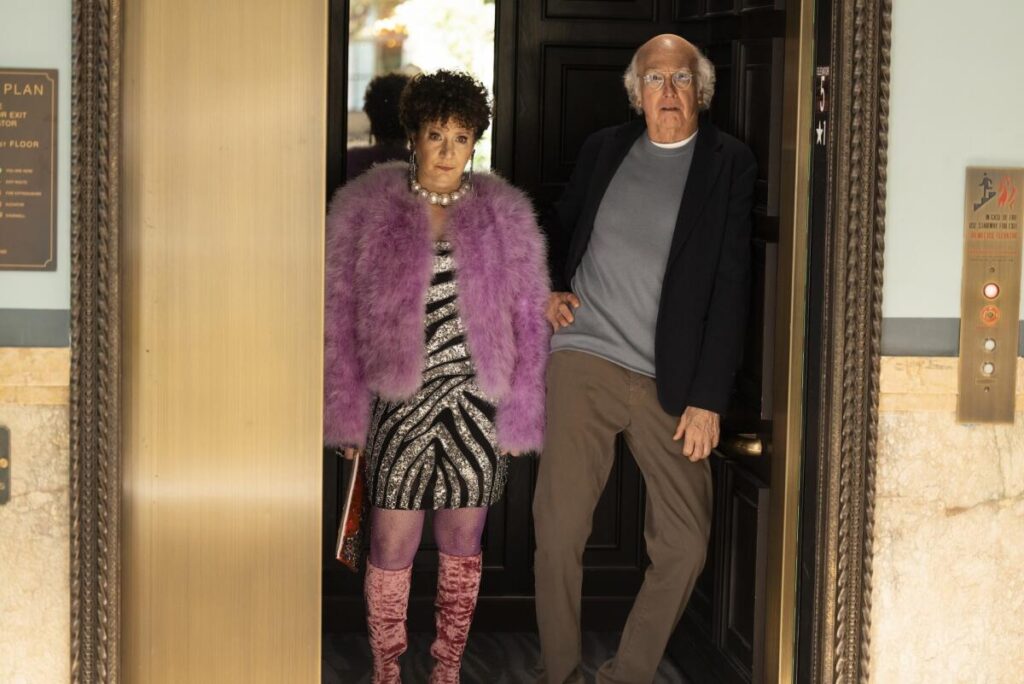“Mr. David. It seems you have a history of doing the same things wrong over and over. And I truly hope this time you finally learned your lesson,” Dean Norris’ Judge Whittaker told Larry David — the fictionalized version of himself — during the series finale of HBO comedy “Curb Your Enthusiasm.”
He has not.
The line, which came with the judge sentencing the comedian and writer to a year in jail, was meant to be read as both literal and meta. Neither the fake Larry David, who has spent 12 seasons calling out “pig parkers” and insulting someone’s “beloved aunt”— and who now can’t even pay attention as his attorney Sibby Sanders (Sanaa Lathan) attempts to deify him to a jury — nor the real Larry David, who is a staunch defender of the similar ending for his and Jerry Seinfeld’s NBC sitcom “Seinfeld,” has ever been capable of learning a life lesson (Driving the point home, the last episode of “Curb” is titled “No Lessons Learned”).
“Curb” executive producer and showrunner Jeff Schaffer, who also directed Sunday’s finale, says the impetus for the finale came when they were writing a scene from earlier in the episode when a boy hits David’s character in the head with a ball. The child’s mother wants him to apologize and learn from his mistakes. The wisdom David’s character imparts to the tyke? That, despite being a septuagenarian, he’s never learned a life lesson.
“We realized we should own that and tell everyone Larry’s never learned a lesson and just do the finale again,” Schaffer says, adding that “Larry doesn’t care what you thought about the ‘Seinfeld’ finale. He cares so little about your thoughts that he’s going to redo it.”
And, although the “Curb” finale is full of call-backs and nods to the “Seinfeld” finale — including bringing back Seinfeld himself to be the episode’s Superman to save the day by getting the charges dropped — there is at least one major difference between the two. In “Seinfeld,” the four leads stand trial for their meanness and are sentenced to a year in jail together because they were caught mocking another person. In “Curb,” our hero’s on trial because of a decent act. He gives water to his friend Rae (Ellia English) when she’s in line to vote during a hot day in Georgia; a gesture that’s illegal under the state’s Election Integrity Act of 2021.
Still, Schaffer says “the parallel between the ‘Seinfeld’ and ‘Curb’ instigating incident doesn’t really exist” and that “it wasn’t something that motivated us in the writing.”
“It was Larry saying, ‘You know, this is crazy law in Georgia, I should get arrested for that,’” Schaffer explains. “It wasn’t ‘I’m gonna perform an act of kindness.’”
In an interview that has been edited, and condensed, for clarity, Schaffer and “Curb” co-star Susie Essman school The Times on “Lessons Learned” and other takeaways from the show’s last season.
Susie Essman, not Larry David, has the last line in the “Curb Your Enthusiasm” finale.
(John Johnson/HBO)
Susie, you have the last audible line of “Curb.” Your character, Susie Greene, and other key characters are fighting on the airplane on the way back to Los Angeles and you tell David’s character, in so many words, to shut up and go back to jail. How does that feel?
Susie Essman: It feels good. It made me very happy. I saw it last night for the first time. And I was like, “Oh, wow, I have the last line.” It’s fitting that Susie should have the last line in the world that we have created here. I don’t think that was on purpose. My voice just happened to be loud.
Jeff Schaffer: It was a final, strident grace note. When we were filming that scene, we tried a lot of different things, as we always do. There were these moves that as everyone was arguing, we would drift over to Larry. The idea, as we conceived it, was sort of ending on Larry’s face. When we were in the editing room, Larry goes, “This isn’t right. It shouldn’t end on me, it should end on our group.”
He was so great about that. Because when we ended on Larry, no matter what expression he gave, it still felt sentimental. And that’s not what we were going for. But when you end it on our guys doing what they do best, which is going at each other, you get this feeling of this is what they’re always going to be like. It’s the best retinal ghost of the show.
The finale also pays homage to Richard Lewis, who was sick while filming this season and died in February, by referencing a scene from the first episode of “Curb” and also seeing Larry continue to sabotage his friend’s love life. Were you intentionally trying to focus on him?
Essman: We didn’t know Richard was going to die, that’s for sure. He was not well, and clearly anybody who sees the season can see he’s not well. But his death was quite shocking. I don’t think anything was written toward that.
Schaffer: Once we knew we were going to do this recapitulation of the “Seinfeld” finale, the question was how far do we take it? How close do we get to the end? I really wanted us to get to that pull-out shot [of Larry in jail and repeating a conversation he’s already had; just as Jerry had done]. … It was all about [let’s] take it as far as we possibly can and make people think that we just were redoing it, shot for shot at the end.
There’s also a whole bit in the courtroom of David swatting at a fly as his attorney attempts to lionize him. And some of it is shot from the fly’s point of view. Why did you want to change up the look of the show by directing that?
Schaffer: Honestly, because it’s funny seeing Larry really go into that straight-to-camera of him trying to kill that fly during this spirited defense. The fact that he didn’t hear a word she said was funny. So we were just mixing up the shots. We wanted that shot. We wanted to see it from the jury’s POV. We wanted him in the background. There was also just one shot of his hand slamming on the table.
It was just building that sequence out of Larry trying to hunt the fly like he’s a tiger in the jungle during that speech.

Larry David and Jerry Seinfeld in the series finale of “Curb Your Enthusiasm.”
(John Johnson/HBO)
The finale has a “Seinfeld”-like scene with Larry and Jerry riffing on a hypothetical about dating a bearded lady from the circus. I’m assuming there’s a lot of unaired footage from that exchange.
Schaffer: Larry had had this hypothetical that he wanted to talk about during the season. … We didn’t know what show to put it in. And it was like, ‘Oh, this is perfect.” I’m so glad we saved it. It was the perfect hypothetical for Jerry and Larry to talk about so you could just see these two be funny together and get a sense of “OK, maybe this is how ‘Seinfeld’ got written. It was just watching these two pals making each other laugh.”
And I’m assuming that Seinfeld was OK with poking fun at his show’s finale?
Schaffer: He loved it. After we shot the jail scene, he said, “This is so great. This is a joke that’s 26 years in the making.”
This season has also gotten some intense fan reactions. An actual billboard of Essman’s character modeling her line of caftans was defaced in a similar manner to what happened to the one on the show. And a fan at a Bruce Springsteen concert came with a sign that referenced the musician’s guest appearance on the show. How are you feeling about this fandom?
Essman: Oh, my God. People called and said, “Are you upset by this?” when the billboard was defaced. I thought it was the funniest thing in the whole world. I mean, it was no small feat to get up there and do the graffiti. … They needed ropes and scaffolding.
Schaffer: It was our genital “Field of Dreams.” If we build it, they will deface it.
And poor Bruce. He does us a huge favor. He does one day of shooting, and now, for all of his concerts .…
Essman: And let me say something very important: Bruce improvised that line. He was really not given his stuff. Sometimes, somebody comes on and they’re not an actor and are spoon-fed. That’s not true. He was brilliant.
Do either of you find the “Seinfeld” finale to be as divisive as the rest of the internet seems to?
Essman: I haven’t watched it since it aired. And honestly, when it aired, I thought it was fine. And I haven’t really thought about it since then.
Schaffer: Larry and I watched it again when we realized we were doing this. … And [we both thought] that it was funny. That made this even more perfect. Because it was like, if you didn’t like that, f— you. We’re gonna do it again.
That’s one of the things I love about this finale. It’s bigger than “Curb” and it speaks to Larry as a contrarian. It not only wraps up the show, but it helps wrap up all this amazing work that Larry has done in a very Larry way. [That] is, “I thought it was funny. And you know what, I still think it’s funny.” And you know what? He’s right.

